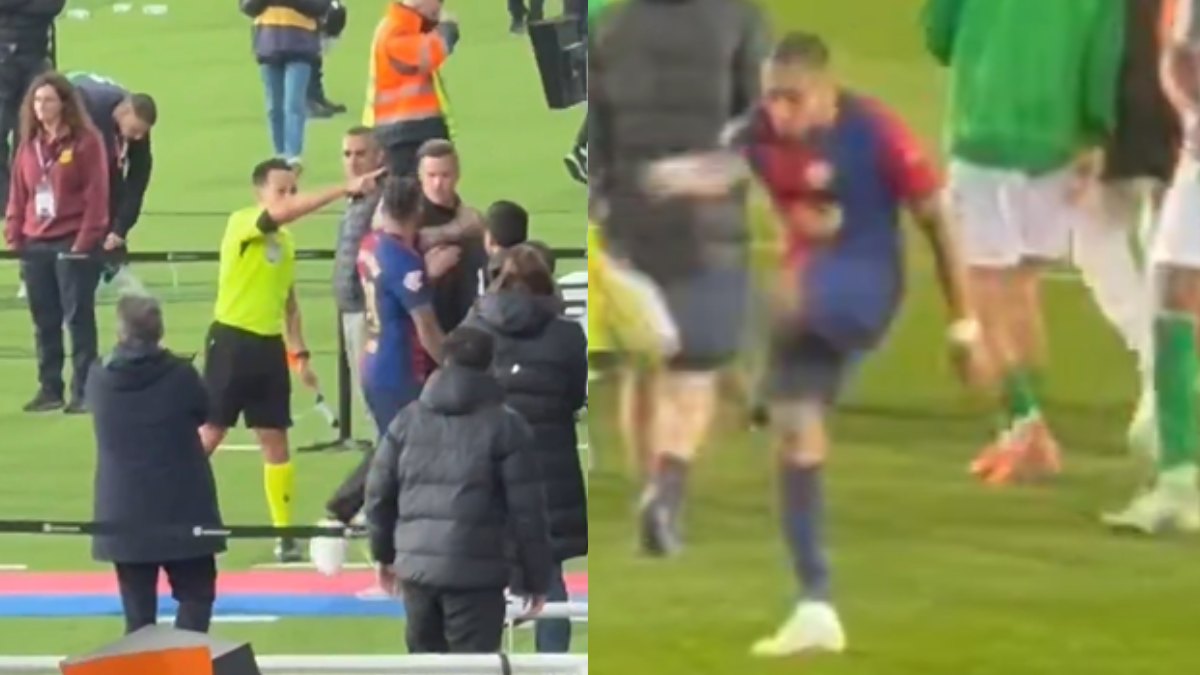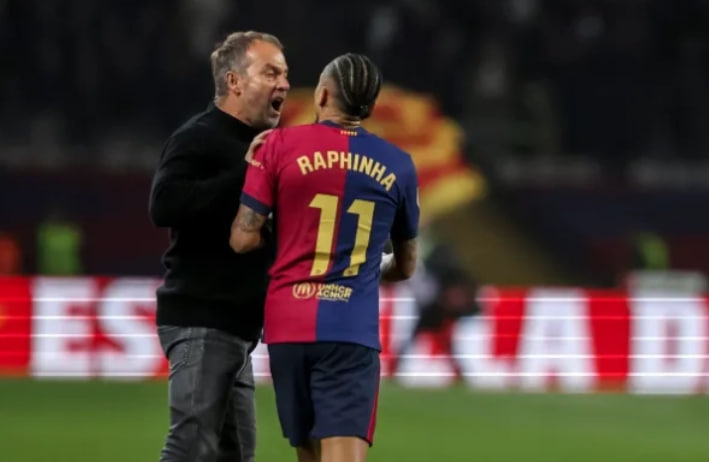In a La Liga match last weekend, Barcelona and Real Betis drew 1-1. However, the bigger focus after the match was the heated argument between Barcelona player Rafinha and head coach Hans-Dieter Flick and teammate Marc-André ter Stegen.
This conflict not only revealed the internal tension in the team, but also raised questions about Barcelona’s form at a critical stage of the season.

Failing to take the lead: Barcelona missed the chance to extend their lead
Real Madrid had lost 1-2 at home to Valencia earlier in the day, which would have been the perfect opportunity for Barcelona to extend their lead. A win against Betis would have seen them extend their lead to six points and further consolidate their position at the top of the La Liga table.
Barcelona started the game positively, with Gavi scoring a goal shortly after the start. It looked like they were ready to take the win. However, in the 17th minute, Betis player Natan quickly scored an equalizer.
After that, the game became deadlocked. Although Barcelona dominated the ball, they were unable to score again and had to settle for a draw. The draw left Barcelona only four points ahead of Real Madrid, with both teams having played 42 rounds.
Rafinha’s anger erupts: from being substituted to pushing a teammate
The tension on the pitch quickly escalated after the match. Rafinha, who was replaced in the 57th minute, was clearly unhappy about his exit. After the whistle, he charged straight onto the pitch and walked towards the referee, looking very emotional.
Not only that, but Rafinha also had a short and obviously heated conversation with head coach Flick. The media captured their tense expressions and confrontational body language as they spoke.
What’s even more surprising is that when goalkeeper Ter Stegen tried to comfort Rafinha, the latter showed strong rejection. He pushed Ter Stegen away, and Ter Stegen immediately responded by waving away Rafinha’s hand and pushing him in the direction of the player’s tunnel.
This kind of scene is not common in a big team like Barcelona, especially in the final sprint of the season. The emergence of such open conflicts in the team undoubtedly makes people worry about whether there is something wrong with the atmosphere in the locker room.
Flick’s response to the incident: Rafinha was angry with me
After the game, when asked about the conflict by reporters, head coach Hans Flick did not evade the issue. He said, “Rafinha was not blaming the referee, he was angry with me. He came over and shouted at me, obviously very unhappy with me taking him off.”
Judging from Flick’s tone, he tried to calm the storm, but at the same time expressed concern about the player’s emotional management. After all, in a crucial match, if a player’s personal emotions affect the team’s atmosphere, it could have a greater impact on subsequent matches.
Rafinha has had a stellar season, but his emotions are a potential liability
Although the altercation in this match has put Rafinha in the headlines, his performance on the pitch this season has been impeccable. He has scored 24 goals and contributed 13 assists in all competitions so far, and is one of the key figures in the team’s attack.
That is why his substitution triggered such strong emotions of discontent. He may have thought he could still create chances for the team, or he may have felt that the timing of his substitution was incomprehensible. But the negative effects of losing control of emotions have far exceeded the gains and losses of the game itself.
Barcelona’s schedule is tight, with the Champions League battle against Borussia Dortmund approaching
Barcelona currently leads Real Madrid by four points, and although the gap has not been widened, the initiative is still in their hands. However, they cannot afford to make too many mistakes.
Next, Barcelona will face Borussia Dortmund, a powerhouse in the German Bundesliga, in the first leg of the Champions League quarterfinals. This match will put even higher demands on the team’s morale and competitive state.
Meanwhile, Atletico Madrid are also closing in fast. If they can win away to Sevilla, they will reduce the gap to Barcelona to just seven points, making the battle for the La Liga title even more intense.
Conclusion: Emotions and victory – Barcelona must choose
A 1-1 draw is not just a loss of two points. For Barcelona, the greater loss may be the unity and emotional management within the team. Rafinha is a key player, but this public display of dissent may result in internal punishment from the coaching staff or the club.
In the final stretch of the season, every game and every player’s form can determine the final champion. If Barcelona hope to stabilize the situation, they must quickly quell this conflict and ensure that similar incidents do not recur.
The upcoming match against Borussia Dortmund is not only a crucial battle in the Champions League, but may also serve as a test of Barcelona’s internal unity.
